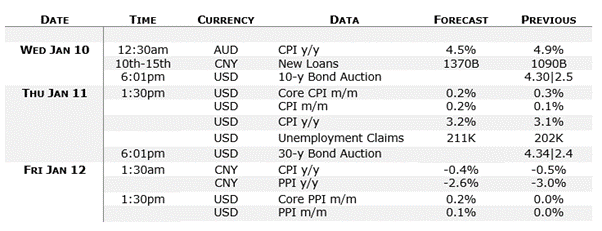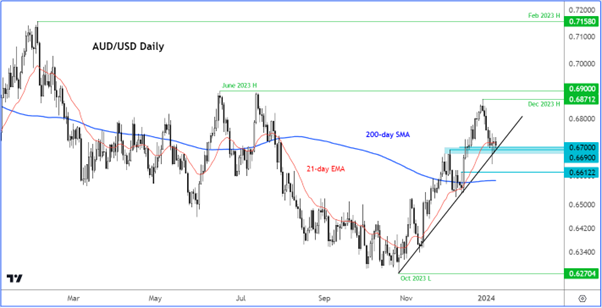The US dollar is continuing to consolidate after Friday’s mixed data left the probability of a March rate cut above 50%, keeping yields steady around the 4% mark on the ten-year debt, states Fawad Razaqzada of Trading Candles.
Investors will be eyeing key inflation data later in the week as speculation continues over the timing of the Fed’s first rate cut. We also have important inflation data from Australia and the country’s largest trading partner, China. This makes the AUD/USD a key currency pair to watch and trade this week. Monday’s rally on Wall Street means the risk appetite may have returned, which should be good news for commodity dollars.
US Dollar Traders’ Focus Turns to CPI
The US dollar index ended the first week of the year higher, as investors reduced bets of a March rate cut by the Federal Reserve. The dollar was somewhat firmer against the majority of G10 currencies on Monday morning, before closing lower. The greenback started Tuesday’s session similarly, so let’s see if it will again drift lower once US investors enter the fray. US ten-year bond yields, which also turned lower on Monday after finding strong resistance from the key 4.05-4.10% area, were a bit firmer.
Friday’s conflicting data from the world’s largest economy created a bit of uncertainty in the markets. The headline nonfarm payrolls beat was not as strong as it looked given those downward revisions to the previous months' data. Then the ISM survey came out much weaker and this accelerated the dollar selling. The employment component of the ISM services PMI showed a big drop in contraction from 50.7 to 43.3. However, by the close of play, the dollar had bounced off its lows again, leaving it little changed in the session.
The fact that the probability of a rate cut in March is a coin flip suggests investors are not sure the slowdown in the labor market is rapid enough yet, even if the labor market is certainly cooling. This is especially true considering that wage growth remains resilient and the unemployment rate is low. Given that the employment picture is not very clear, the dollar should remain very sensitive to incoming data, with the focus turning to the December CPI and PPI reports, scheduled for release on the last two days of the week.
Aussie and Chinese Inflation Data Puts AUD/USD Into Focus
Ahead of the US inflation data at the end of the week, the economic calendar this week will include CPI data from Australia on Wednesday. In contrast, China’s inflation figures will come out on Friday. Aussie retail sales came out stronger at 2% overnight, but this failed to make a material difference in the AUD’s direction, given that the currency’s focus is more global right now and on inflation data than anything else.
Here are this week’s key data highlights relevant to the AUD/USD pair:

AUD/USD Technical Analysis

Source: TradingView.com
The AUD/USD has started the month of January lower after finishing each of the previous two months in the positive territory. The loss of bullish short-term bullish momentum is hardly surprising given how extreme investors had priced in the Fed’s rate cuts. Anyway, the bullish trend is still intact given that the price has not broken any major lows yet.
The AUD/USD was testing key support around the 0.6700 area at the time of writing. Here, prior resistance met with the bullish trend line going back to October. On Friday, the AUD/USD posted its first positive close in 6 sessions. On Monday, it recovered from a negative start to finish positive. On Tuesday, it was lower, again to the frustration of the bulls. But should it be able to recover later on in the day, and end above Monday’s high, then this could be a sign that it has hit a bottom and the bullish trend is about to resume. In this potential event, the bulls will aim for the December high at 0.6871 or the June peak at 0.6900 as their next upside objective.
Bullish traders must await such a bullish reversal signal given the recent bearish price action. In the event of a bullish no-show, then there is a risk the Aussie may dip to test the next support at 0.6610ish or even the 200-day average at 0.6585ish, before potentially reversing.
To learn more about Fawad Razaqzada visit TradingCandles.com











